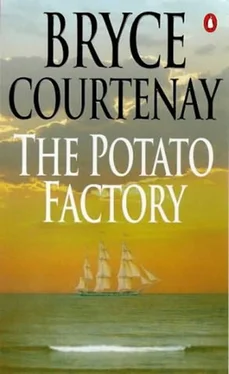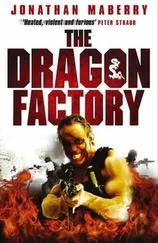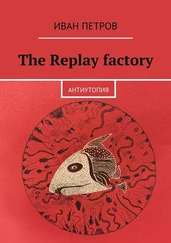'Twenty and fifty, I do declare!' Ikey announced triumphantly and laid the two parcels on the table. Maggie the Colour sucked at her upper lip and commenced to untie each of the small parcels, not opening either until the twine had been removed from both. Then she revealed the etchings, leaving each on its own square of bill paper.
Ikey took a corner of each sheet and pulled them together then added the wrapping from the hundred pound plate, and the original piece with the corner removed, so that the four pieces of paper formed a rectangle two feet wide and three square.
'There you are, one complete sheet? Big enough, if I may say so, to make three dozen banknotes of any denomination you likes, my dears.' He paused and then added, pointing to the square made from the four separate sheets of paper, 'We 'as the pleasure o' makin' available to your good selves one 'undred and ten sheets o' the very same watermarked and quite perfect paper!'
Maggie the Colour snorted. 'And at what sort o' risk do these one 'undred and ten sheets come to us? Too 'ot to touch, I should think!'
'I shall sell you one 'undred and ten pristine sheets o' this bill paper without any risks o' the source becomin' known, this bein' me available stockpile. Then, if the paper proves to your likin', I could offer you a continuin' supply at the rate of one 'undred sheets per annum, the delivery to be made at eight sheets per month and paid in gold sovs on delivery.' Ikey was not sure how he would bring this about, but as the business opportunity presented itself so neatly he found it impossible not to capitalise on it.
'Eight sheets per month, that be only ninety-six sheets, not one 'undred!' Maggie snapped.
Ikey laughed, impressed at her quick calculation. 'Madam, we 'ave a savin': "Always leave a little salt on the bread!" You gets the extra four sheets as a Christmas gift, compliments o' the 'ouse o' Solomon!'
'The paper, it's too good, you didn't make it did you, it's the real thing, ain't it?' Maggie said pointedly.
Ikey touched his finger to his nose and sniffed. 'Well I must most reluctantly confess, my dear, you've hit the nail on the 'ead. It's the same what the Bank of England uses, not a scintilla different, not a smidgin, not one jot or tittle different from what they uses to print their own longtails.'
'And the watermark?'
'The same! Woven in, my dear, the very innermost part o' the bill itself. Can't be removed no matter what you does, stamp, wash, bite, tear, while the paper remains, the mark is there!'
'And you've got one 'undred and ten sheets o' same?' Silas Browne asked again.
Ikey picked up the plate for the hundred pound Bank of England note and cackled, showing his yellow teeth. 'Or three 'undred and sixty thousand pound worth o' paper if you've a mind to use only this little beauty, my dear!'
'Why 'ave you come to us, Mr Solomons?' Maggie asked. 'Why 'as you not gorn into business y'self like?'
Ikey shrugged his thin shoulders and spread his palms and smiled.
'I only works with the best. It ain't me line of business, see. Ain't me expertise, ain't what I knows best. A man must stick to what 'e knows, the cobbler to 'is last, the butcher to 'is block, the poacher to 'is traps. These,' he pointed to the copper plates, 'they come about in the business o' receivin'. Receivin' and disposin' is me business, my dear, I received these and now I am disposin' o' them. Simple arithmetic, if you knows what I mean?'
'Aye, 'e be the prince of all the London fences,' Silas Browne agreed, glad to find a way back into the conversation. 'I knows him for that reputation.' He looked directly at his wife. 'That be the truth Maggie m'dear, Mr Solomons 'ere is a well-regarded London fence, also known and trusted in these Midland parts.'
Maggie the Colour sniffed. 'And the paper? That be fencin' business too?'
Ikey looked amused. 'If you 'as the right connections, my dear, everything Gawd made on this earth is fencin' business! All it takes is a little cash and a mind for makin' a connection 'ere, another there. Innovation is what some modern folks calls it. Let me give you an example. A lovely little silver candlestick goes missing from Mrs A's 'ouse and is brought to Mr B, what is me, yours truly. I knows Mr C, who will melt it down and sell the silver content to Mr D, a most excellent silversmith who is innocent of all guile. He will craft it into a fish server what might then be bought again by Mrs A to console 'erself over the tragic loss of 'er lovely little silver candlestick!'
Ikey clasped his hands together and dry rubbed them. 'All because o' the noble art o' ready cash and steady connections the world o' trade goes round and round, and we all profits nicely on that particular merry-go-round. What say you, my dear?'
'You may speak for y'self,' Maggie sniffed. 'We are not accustomed to the ways o' stealin'.'
Ikey smiled. 'Quite right, my dear, only from the banks who can afford it, ain't that so? Forgery ain't fencin', that's the truth, forgin' is the veritable Robin Hood profession, almost Christian, a perfect example o' robbin' the rich to pay the poor, an honourable profession it is to be sure.' He paused to take a breath. 'But one what also requires from time to time a connection or two? Maybe a paper connection what come from A to B, what's me, and then goes on to C, what's thee!' Ikey clapped his hands, pleased with his neat little summary.
'Aye, it be good paper, the best, that I admit,' Silas Browne said, 'though we'd be more friendly disposed if we knew more about where it come from.' He pointed at the bill paper. 'Paper the quality of your'n, tha' be mill, tha' be special!'
It had all begun when a carpenter and works mechanic named George Betteridge, who was much taken by the game of ratting, fell into debt to Ikey. Despite two separate attempts with Ikey's own little terriers to get back his promissory notes, he still owed a considerable sum. Ikey, as was the custom, requested that he pay up by the following week, either in cash or in kind to the value of what he owed, a debt of nearly ten pounds. The hapless Betteridge confessed that he was penniless. He had a wife and seven children, lived in a single rented room in a village in Hampshire, and possessed nothing of sufficient value to match the debt. Furthermore, he saw no prospect of obtaining goods to the required value as a petty thief. Nor was he placed in a position to steal from a rich master, being employed as a carpenter doing general maintenance work for a paper mill in the village of Whitechurch.
'Paper is it? What sort o' paper?'
It was a routine question. Ikey was accustomed to probing into the unused corners of the minds of men who lack imagination, and who are unable to see the opportunities for profit right under their bumpkin noses.
'All sorts o' paper, all special,' the carpenter replied.
'Special is it? What's its name then?'
'Name o' Laverstoke Paper Mill, very reputable, been making particular papers for nigh sixty years, they 'as.'
'Laverstoke eh? By particular, does you mean expensive?'
'No, no, it ain't paper you can buy, like!' Betteridge corrected then lowered his voice and cupped his hand to the side of his mouth. 'Paper for bills, banknotes, very secret it is, very 'ush-'ush!'
Ikey concealed his excitement. 'May I ask you a question, Mr Betteridge? Does you know, or could you make the acquaintance, o' someone what works in this section what you says is strictly private. That is, the particular section what makes your actual paper for these… er, bills?'
The carpenter scratched his head, thinking. After a moment he volunteered, 'Me wife 'as a second cousin, a young cove what goes by name o' Thomas Tooth. Methinks 'e works in one o' the sections by front office, though I can't say for sure, 'e being a clerk an' all and me only 'umble carpenter and mechanic'
Читать дальше












